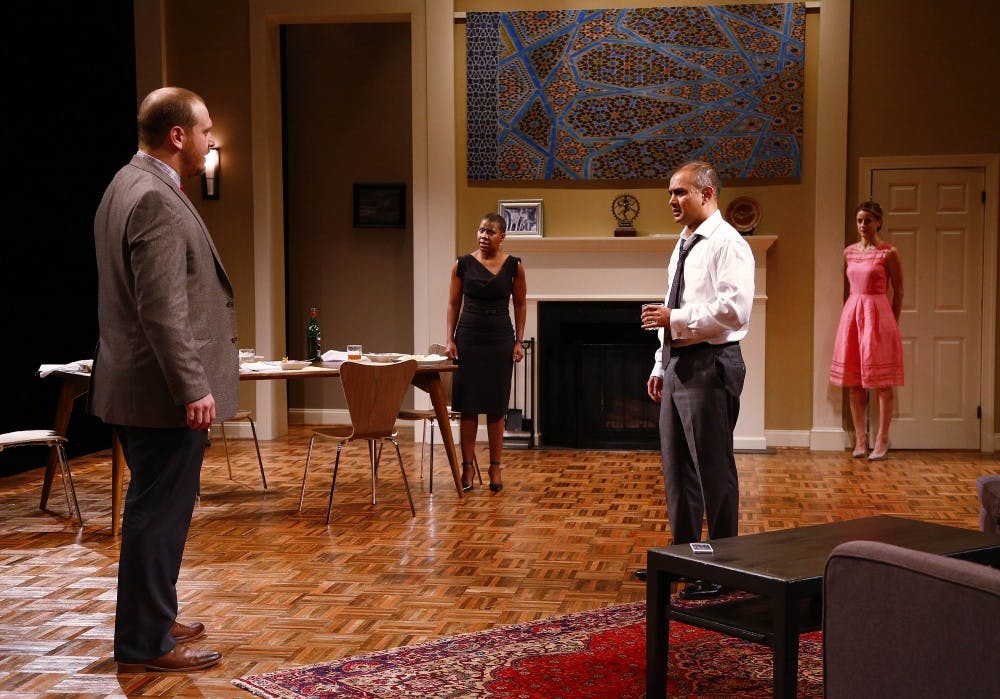There are many critical faux pas that often manifest from the interpretive naïveté of the critic. Terms like “impression,” “opinion,” and “feeling” often litter the pantomime of many a subpar “review.” However, and most especially in the context of PlayMakers’ production of Ayad Akhtar’s Pulitzer Prize-winning play "Disgraced," it would be a disservice to Mr Akhtar, the cast, and production team to belittle the work with such empty folly.
A proper critical assessment of artistic quality is not necessarily subject to the critic, but instead dictated by how the artwork chooses to present itself. Why do we see what we see? Why is the plot unfolding this way, and not some other way? What might this mean?
"Disgraced" is not a play about Islam, Islamophobia or post-9/11 Manhattan. "Disgraced," like all plays, is about plays themselves.
During the composition of a play, the playwright must conform to a set of very specific formal constraints, as well as respect the contextual canon of tradition and style that circumnavigates the work in constellations and networks of association. Actors wear costumes, follow written instructions for behavior and dialogue and exist within a setting -— none of which is real, of course, but comprises the format through which the playwright may communicate his content through the plot.
Now, from the universal to the particular, "Disgraced" offers a story of “one dangerous dinner party.” A lapsed-Muslim protagonist named Amir (played by Rajesh Bose), lives in a constant, desperately futile attempt to purge himself of his Islamic heritage, yet fails to maintain the flexibility necessary to live harmoniously with his curious, idealistic wife Emily (Nicole Gabriella Scipione).
Emily, an artist whose career in New York is on the rise, is enchanted by Islamic art and culture, which she finds refreshingly disciplined, free from the self-centered humanistic egotism that flourished in the West during the Renaissance.
But the true virtuosity of Akhtar’s work lies in his understanding of the self-reflexive relationship between form and content. He understands that the play, like any art form, poses an imperative constraint and, much like Islam, requires a submission to this constraint.
As the evening tensely disintegrates into racially-charged confrontational debauchery, we quickly discern the play’s purpose, as well as the universal truth in the periphery: any rejection of form will always remain in direct relation to the form itself. No matter how hard Amir tries to escape his Muslim identity, he will always be running away from it, as opposed to toward something else.
Emily appreciates the beauty of holy submission to Allah, as well as the strict geometrical and non-representational artistic modes of Islamic painting. But for Amir, disgrace manifests in a denial, a rejection of grace, of form. When everything falls apart, when the damage is done, when wounds are opened and relationships severed, when frustrated anti-formalism quickly procreates bastard meaninglessness, neither life, nor art, nor theater can exist.
"Disgraced" is a play about the theater and all that that may imply. The playwright, as does any artist, works within a finite space dictated by formal and structural systems. To this end, at the very least, Akhtar’s work is formally astounding and a brilliant success.
My sincerest “bravo tutti” to PlayMakers for its magnificent interpretation and presentation of a remarkably necessary artwork to the Chapel Hill and UNC communities.
@logan.wolk
arts@dailytarheel.com
To get the day's news and headlines in your inbox each morning, sign up for our email newsletters.





